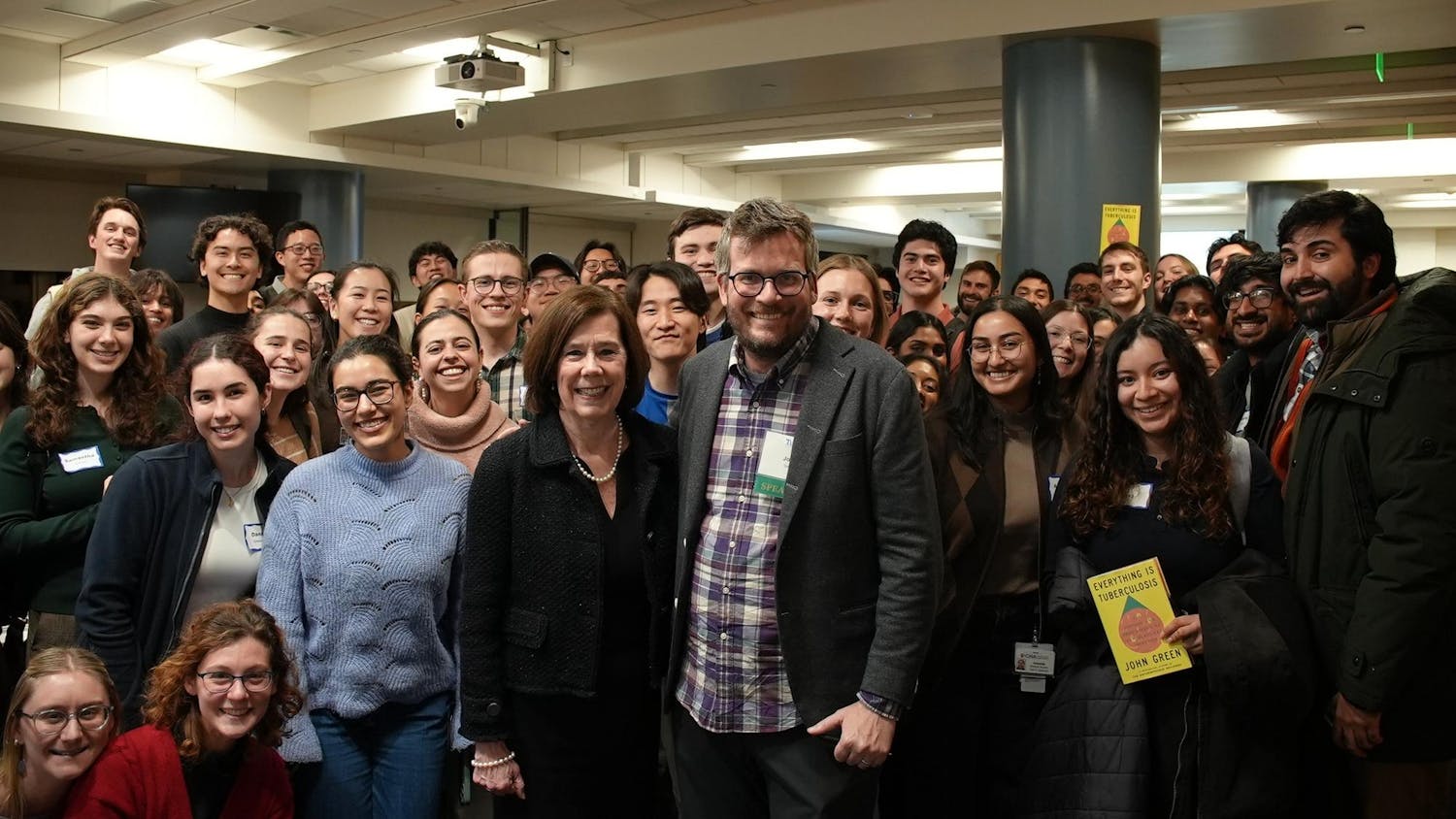Most first-years spend the fall semester finding their way around the hills of Tufts. Not the Tufts Civic Semester fellows, though. They completed internships, learned Spanish and stayed with host families in Urubamba, a town in the mountains of Peru's Sacred Valley.
Civic Semester,one of two overseas service programs for first-years organized by the Jonathan M. Tisch College of Civic Life, offers selected first-years in the School of Arts and Sciences an opportunity to volunteer overseas and receive academic credit during their first semester of college.
The program was initially launchedwith a second service location in Kunming, China, but those plans did not materialize due to insufficient interest from students, according to Mindy Nierenberg, Tisch College's senior director of programs.
"For 2020 ... we will be offering Kunming again, because we believe that is also an excellent location, and there may potentially be a third location, which we are still working on right now," she said. "We are hoping for greater numbers [of students]."
The inaugural cohort of 12 Civic Semester fellows have since rejoined their peers on the Tufts campus.
Nierenberg said that the first year of Civic Semester was an overwhelming success.
"It was a truly extraordinary experience," she said. "Those 12 students, each of them put so much into it and were so open to the experience."
At the heart of the program is an internship with a local nonprofit organization, Nierenberg said. For 20 hours a week, students worked alongside community members in fields ranging from sustainability to rural health.
"We [had] placements for students that would both match what they [were] interested in but also expand their horizons," she said. "We wanted to have a balance ... of understanding that a student is still learning and is not a professional, but also not wanting to draw capacity away from the organization ... so that [the students] are having some type of positive impact."
Yong Quan Tan, a Civic Semester fellow, was placed at Eco Huella, a family-owned farm focused on sustainable indigenous agriculture. His work involved daily farming duties, building greenhouses for high-altitude Andean communities and facilitating visits from local and international organizations.
"It was a time for me to understand the challenges faced by frontline communities ... and the urgency for them to adjust and to change the way they work and they live their lives in order to confront [climate change]," Tan, a first-year, said.
Through his time at Eco Huella, Tan has learned more about the actions that can be taken against climate change.
"[I am] being more environmentally conscious ... not just of our consumption habits ... but also of a greater need for pushing back against factors that are contributing to climate change, and the power of us consumers [who] can decide what kind of choices companies can make to benefit the climate," he said.
Austen Money, also a Civic Semester fellow, worked at Canastas Verdes, a women-run farm that grows and sellsorganic produce.
Money, a first-year in the School of the Museum of Fine Arts combined degree program, tapped into her artistic skills to develop, design and illustrate a recipe book for the farm.
"There are weekly basket deliveries, and it's all produce that's not really chosen by the customers, it's just chosen by the [farmers] based on what's in season. A lot of people didn't know how to use the produce they were getting in their baskets, so a lot of it would get thrown out. The recipe book was meant to help people who didn't know how to use the produce figure out how to use it," she said.
Learning to work independently was one of the biggest challenges about the internship, Money said.
"When I started with the organization, I figured that they were going to tell us everything we needed to do, when we needed to do it exactly, what they needed help with. But it turned out there was actually a lot more room for working independently, so I had to figure out how to be a little bit more independent and ... push my ideas forward if I wanted to see them put into place," she said.
Civic Semester fellows Victoria Rose and Olympia Swaby worked at Sacred Valley Health, known locally as Ayni Wasi. It provides health services to underserved rural communities in the Sacred Valley by educating and empowering locals as community health workers.
"I [like] that Sacred Valley Health recruited women from the communities, as opposed to getting trained U.S. doctors or healthcare workers ... [The women] can learn and then go back and be leaders and have power within their own communities," Swaby, a first-year, said.
Rose, a first-year, said that the experience showed her the importance of being "culturally appropriate" in health interventions, such as designing growth charts for parents using visuals rather than words and numbers, or considering differences in beauty standards across cultures when planning activities around body image.
"I try to be a conscientious, reflective person, but I think [the program] has heightened that quality of myself," Rose said. "I knew that I wanted to do something with science, medicine, public health, community health and now ... that's definitely, again, reaffirmed for me that it's something that I want to do."
In Peru, besides learning Spanish, students enrolled in an online course taught by Nierenberg, where they discussed and reflected on their internships.
"I see, having read their writings, this heightened concern for the planet and its health and well-being, [and] an understanding that what happens in the U.S. impacts other countries. Many of them heard ... of what happens when the U.S. has a certain posture on climate change and the environment, and how that impacts the environment in Peru," Nierenberg said.
Students also took two introductory courses over the summer in civic studies and Latin American studies, which Rose felt connected strongly with the Civic Semester program.
"What we learned ... did actually carry through and informed our experience in Peru, which I thought was great," Rose said.
Swaby found her host family to be an important source of support.
"One of the hugest challenges for me as a person of color going to Peru was that there were times where I felt really isolated, just because there's not really much exposure to people of African descent, especially in the area that I was in," Swaby said. "But ... my [host] family was really awesome, and when I came in, I had a safe space and I felt good."
After a two-day retreat to reconnect with each other and with Tufts, the Civic Semester fellows are getting back into the swing of things with classes, activities and dorm life in the spring semester.
They will not be alone: All 12 students are living in the same dorm at 123 Packard Ave. and will be taking an advising seminar together. They were also each assigned a student mentor who will support their integration into the first-year class, Nierenberg said.
"I think the general feeling of the group is excitement, but also some nervousness because we're jumping back into things mid-year, and so we don't know as many people as we might have. But then on the other hand, everyone has 11 other people that they're super comfortable with and who they could consider their super close friends," Rose said.
Nierenberg said that Tisch College will continue to partner with Where There Be Dragons, a gap year and study abroad programs provider, in organizing Civic Semester.
"Part of the success too was the range of placements that [Where There Be] Dragons was able to establish," she said. "Having that variety, but also having that basic underpinning of ... we have something to offer but we have so much to learn ... was incredibly important."
Reflecting on her semester in Peru, Rose said that the program pushed her to venture outside of her comfort zone.
"What I learned on this trip is [to] just do things, because so many good things that otherwise won't happen do happen when you take those risks," she said.
Inaugural Tufts Civic Semester cohort returns from Peru

The inaugural class of Tufts Civic Semester fellows is pictured in Urubamba, Peru.





